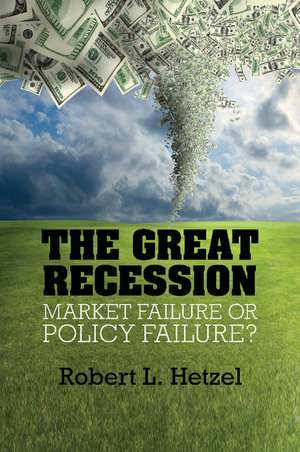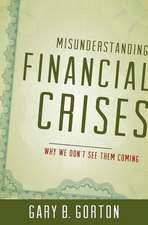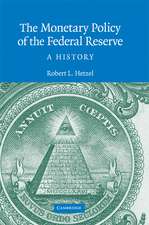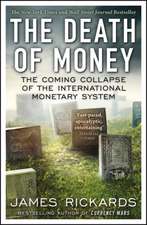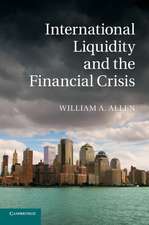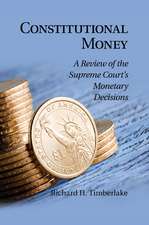The Great Recession: Market Failure or Policy Failure?: Studies in Macroeconomic History
Autor Robert L. Hetzelen Limba Engleză Paperback – 29 oct 2014
| Toate formatele și edițiile | Preț | Express |
|---|---|---|
| Paperback (1) | 293.42 lei 6-8 săpt. | |
| Cambridge University Press – 29 oct 2014 | 293.42 lei 6-8 săpt. | |
| Hardback (1) | 443.43 lei 6-8 săpt. | |
| Cambridge University Press – 15 apr 2012 | 443.43 lei 6-8 săpt. |
Din seria Studies in Macroeconomic History
-
![Teach Your Kids about Countries [Vol 5]: Version Adaptada Al Castellano Actual Por Rafael Antunez y Raul Alonso](https://i4.books-express.ro/bs/9781480268197/teach-your-kids-about-countries-vol-5.jpg) Preț: 61.51 lei
Preț: 61.51 lei -
 Preț: 167.96 lei
Preț: 167.96 lei -
 Preț: 95.31 lei
Preț: 95.31 lei -
 Preț: 40.48 lei
Preț: 40.48 lei -
 Preț: 53.96 lei
Preț: 53.96 lei -
![Teach Your Kids about Countries [Vol13]: Version Adaptada Al Castellano Actual Por Rafael Antunez y Raul Alonso](https://i2.books-express.ro/bs/9781480268272/teach-your-kids-about-countries-vol13.jpg) Preț: 61.51 lei
Preț: 61.51 lei -
 Preț: 125.81 lei
Preț: 125.81 lei -
 Preț: 64.79 lei
Preț: 64.79 lei -
 Preț: 131.58 lei
Preț: 131.58 lei -
 Preț: 86.92 lei
Preț: 86.92 lei -
 Preț: 63.20 lei
Preț: 63.20 lei - 9%
 Preț: 592.73 lei
Preț: 592.73 lei -
 Preț: 95.96 lei
Preț: 95.96 lei -
 Preț: 238.93 lei
Preț: 238.93 lei -
![Teach Your Kids about Countries [Vol 25]: Version Adaptada Al Castellano Actual Por Rafael Antunez y Raul Alonso](https://i0.books-express.ro/bs/9781480268401/teach-your-kids-about-countries-vol-25.jpg) Preț: 61.51 lei
Preț: 61.51 lei -
 Preț: 59.67 lei
Preț: 59.67 lei -
 Preț: 54.03 lei
Preț: 54.03 lei -
 Preț: 92.61 lei
Preț: 92.61 lei -
![Teach Your Kids about Countries [Vol4 ]: Version Adaptada Al Castellano Actual Por Rafael Antunez y Raul Alonso](https://i3.books-express.ro/bs/9781480268180/teach-your-kids-about-countries-vol4.jpg) Preț: 61.51 lei
Preț: 61.51 lei -
 Preț: 135.03 lei
Preț: 135.03 lei -
 Preț: 75.99 lei
Preț: 75.99 lei -
 Preț: 104.33 lei
Preț: 104.33 lei -
 Preț: 130.65 lei
Preț: 130.65 lei -
 Preț: 201.11 lei
Preț: 201.11 lei -
 Preț: 83.38 lei
Preț: 83.38 lei -
 Preț: 56.92 lei
Preț: 56.92 lei -
 Preț: 177.10 lei
Preț: 177.10 lei -
 Preț: 62.62 lei
Preț: 62.62 lei -
 Preț: 74.52 lei
Preț: 74.52 lei -
 Preț: 123.49 lei
Preț: 123.49 lei -
![Teach Your Kids about Countries [Vol 17]: Version Adaptada Al Castellano Actual Por Rafael Antunez y Raul Alonso](https://i2.books-express.ro/bs/9781480268326/teach-your-kids-about-countries-vol-17.jpg) Preț: 61.51 lei
Preț: 61.51 lei -
![Teach Your Kids about Countries [Vol 22]: Version Adaptada Al Castellano Actual Por Rafael Antunez y Raul Alonso](https://i2.books-express.ro/bs/9781480268371/teach-your-kids-about-countries-vol-22.jpg) Preț: 61.51 lei
Preț: 61.51 lei -
![Teach Your Kids about Countries [Vol8]: Version Adaptada Al Castellano Actual Por Rafael Antunez y Raul Alonso](https://i2.books-express.ro/bs/9781480268227/teach-your-kids-about-countries-vol8.jpg) Preț: 61.70 lei
Preț: 61.70 lei -
 Preț: 208.23 lei
Preț: 208.23 lei -
 Preț: 96.04 lei
Preț: 96.04 lei -
 Preț: 96.45 lei
Preț: 96.45 lei -
 Preț: 46.84 lei
Preț: 46.84 lei -
![Teach Your Kids about Countries [Vol2]: Version Adaptada Al Castellano Actual Por Rafael Antunez y Raul Alonso](https://i1.books-express.ro/bs/9781480268166/teach-your-kids-about-countries-vol2.jpg) Preț: 61.51 lei
Preț: 61.51 lei -
 Preț: 55.99 lei
Preț: 55.99 lei -
 Preț: 69.21 lei
Preț: 69.21 lei -
 Preț: 72.83 lei
Preț: 72.83 lei -
 Preț: 51.11 lei
Preț: 51.11 lei -
 Preț: 88.56 lei
Preț: 88.56 lei -
 Preț: 51.36 lei
Preț: 51.36 lei -
 Preț: 78.74 lei
Preț: 78.74 lei -
 Preț: 93.90 lei
Preț: 93.90 lei - 20%
 Preț: 45.72 lei
Preț: 45.72 lei -
 Preț: 212.46 lei
Preț: 212.46 lei -
 Preț: 71.19 lei
Preț: 71.19 lei
Preț: 293.42 lei
Nou
Puncte Express: 440
Preț estimativ în valută:
56.16€ • 61.03$ • 47.21£
56.16€ • 61.03$ • 47.21£
Carte tipărită la comandă
Livrare economică 21 aprilie-05 mai
Preluare comenzi: 021 569.72.76
Specificații
ISBN-13: 9781107459601
ISBN-10: 1107459605
Pagini: 400
Ilustrații: 64 b/w illus. 4 tables
Dimensiuni: 152 x 229 x 23 mm
Greutate: 0.59 kg
Editura: Cambridge University Press
Colecția Cambridge University Press
Seria Studies in Macroeconomic History
Locul publicării:New York, United States
ISBN-10: 1107459605
Pagini: 400
Ilustrații: 64 b/w illus. 4 tables
Dimensiuni: 152 x 229 x 23 mm
Greutate: 0.59 kg
Editura: Cambridge University Press
Colecția Cambridge University Press
Seria Studies in Macroeconomic History
Locul publicării:New York, United States
Cuprins
Preface; 1. The 2008–9 recession: market or policymaker failure?; 2. Recessions: financial instability or monetary mismanagement?; 3. The great contraction: 1929–33; 4. Monetary policy and bank runs in the great contraction; 5. Vigorous recovery and relapse: 1933–9; 6. Inter-war international monetary experiments; 7. Identifying the shocks that cause recessions; 8. From stop-go to the great moderation; 9. Controlling bank risk taking: market or regulator discipline?; 10. The housing crash: subsidizing housing and bank risk taking; 11. Bubble trouble: easy money in 2003 and 2004?; 12. What caused the great recession of 2008–9?; 13. What caused the great leverage collapse?; 14. The distinctions between credit, monetary, and liquidity policy; 15. Fed market interventions: the experiment with credit policy; 16. Evaluating policy: what are the relevant counterfactuals?; 17. The business cycle: inherent instability or monetary instability?; 18. Why is learning so hard?; 19. How should society regulate capitalism: rules vs. discretion?
Recenzii
'Hetzel's book is a detailed, authoritative account of the recent credit turmoil and recession told as part of a narrative monetary history of business cycles dating back to the nineteenth century. The book is an immensely rewarding read for serious students of central banking.' Marvin Goodfriend, Carnegie Mellon University
'Robert Hetzel's knowledge of the Federal Reserve System, and of monetary history more generally, is exceptionally extensive and insightful. His thesis concerning the main cause of the Great Recession of 2008–2009 will come as a surprise to many readers.' Bennett McCallum, Carnegie Mellon University
'Robert Hetzel applies his experience as a central banker and his expertise as a monetary economist to make a compelling case for rules rather than discretion, showing that 'monetary disorder' rather than a fundamental 'market disorder' is the cause of poor macroeconomic performance. At the same time, he acknowledges and discusses disagreements among those who argue for rules rather than discretion.' John B. Taylor, Stanford University
'The Great Recession upends the conventional view that the recession of 2008–2009 was caused by a massive financial market failure. Instead, Robert Hetzel places blame squarely on the Federal Reserve for failing to ease monetary policy aggressively in summer 2008. He argues that the recession intensified before the Lehman Brothers failure and that contractionary monetary policy turned a moderate recession caused by shocks to energy prices and the housing sector into a serious economic contraction. With a rich narrative and provocative history in the spirit of Friedman and Schwartz, Hetzel returns monetary forces to the forefront of business cycle analysis.' David C. Wheelock, Federal Reserve Bank of St Louis
'Robert Hetzel's knowledge of the Federal Reserve System, and of monetary history more generally, is exceptionally extensive and insightful. His thesis concerning the main cause of the Great Recession of 2008–2009 will come as a surprise to many readers.' Bennett McCallum, Carnegie Mellon University
'Robert Hetzel applies his experience as a central banker and his expertise as a monetary economist to make a compelling case for rules rather than discretion, showing that 'monetary disorder' rather than a fundamental 'market disorder' is the cause of poor macroeconomic performance. At the same time, he acknowledges and discusses disagreements among those who argue for rules rather than discretion.' John B. Taylor, Stanford University
'The Great Recession upends the conventional view that the recession of 2008–2009 was caused by a massive financial market failure. Instead, Robert Hetzel places blame squarely on the Federal Reserve for failing to ease monetary policy aggressively in summer 2008. He argues that the recession intensified before the Lehman Brothers failure and that contractionary monetary policy turned a moderate recession caused by shocks to energy prices and the housing sector into a serious economic contraction. With a rich narrative and provocative history in the spirit of Friedman and Schwartz, Hetzel returns monetary forces to the forefront of business cycle analysis.' David C. Wheelock, Federal Reserve Bank of St Louis
Notă biografică
Descriere
Argues that the 2008–9 recession needs to be understood as deriving from mistakes of central banks and regulators, not financial markets.
